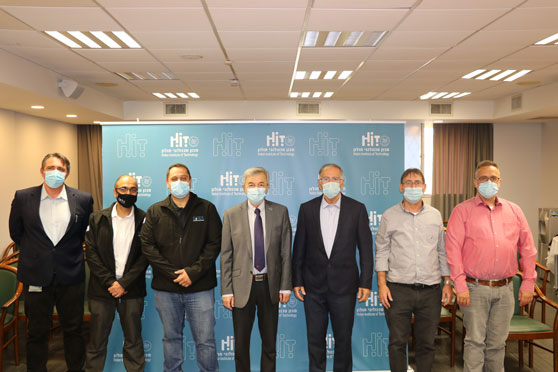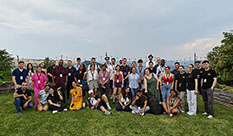More:
News & Stories
Source of Life: Machine Learning Improves Water Quality
A decision-based system based on machine learning will be developed for the Whistling Desalination Plant by students from the Faculty of Science.

From left: Mr. Israel, Mr. Demtov, Mr. Baron, Prof. Yakubov, Mr. Cohen, Mr. Goldberg, Dr. Barkan
The system will help Whistling personnel at both the managerial and operational levels make the right decisions regarding desalination in situations of uncertainty. These uncertainties can touch on issues relating to potential contamination, ecological impact or economic factors – all of which require real time decisions to decrease potential risks and enhance sustainability.
Prof Eduard Yakubov, President of HIT, stressed the importance of the water economy for the State of Israel. “This is a project of national proportion which rightfully relates to water as an existential commodity, for the individual and the world we live in. Beyond its intrinsic importance to life itself, water is a key component in fulfilling Israel’s agricultural, environmental and diplomatic goals. HIT can and must play an active role in the advancement of water technology. Innovation, knowledge and humanity is an integral part of our DNA”.
The Whistling Desalination facility is the largest plant in Israel and among the largest in the world. CEO Semion Baron spoke of the high quality of the water produced by the Whistling Desalination Plant. The reversed osmosis process used at the plant to purify the salt water is both cost effective and sustainable, and meets the most stringent standards, added Deputy CFO Mark Demtov.
Student involvement in this and other water technology projects at HIT reflects our commitment to achieving this national goal. Aharon Cohen, the Director of the Center for Industry Collaboration in the Faculty of Science, sees this as yet a further step by the Institute to expand its outreach in the field, and a natural outcome of the recent opening of the Control and Automation Laboratory on campus in cooperation with Shaham Mekorot. “The cooperation with the Whistling facility is yet another example of how HIT brings industry and entrepreneurial thinking within our campus. It provides unique project-based learning experiences for our students, in both a laboratory and industry setting,” an opinion shared by Mark Israel, the Director of Development at the Center.
Posted: 30/12/2020
- News & Events
International Week of Interdisciplinary Studies and Academic Collaborations in Crete
A substantial delegation of 16 students and four faculty members from HIT Holon Institute of Technology participated in week-long international activities and events at HMU-Hellenic Mediterranean University in Crete. ...


 Additional programs
Additional programs
